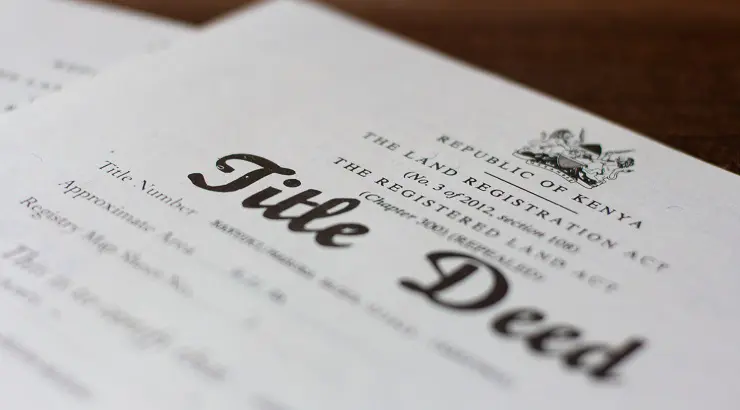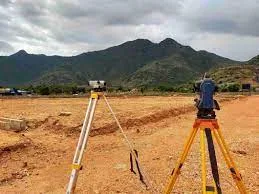How to Conduct a Land Search in Kenya
Learn how to perform a land search in Kenya using online and manual methods. Verify land ownership, check encumbrances, and secure your property investment with this step-by-step guide.
Introduction
How to Conduct a Land Search in Kenya
Conducting a land search in Kenya is a vital step for anyone planning to buy or invest in property. It ensures that the land you intend to purchase is legally owned and free from disputes or claims. With platforms like Ardhisasa and traditional registry offices, the process has become more accessible and efficient. Understanding how to conduct a proper land search in Kenya protects you from potential legal complications and financial losses. This guide will walk you through every step, from identifying the land to interpreting search results.

Understanding Land Ownership in Kenya
Before conducting a land search, it’s essential to understand how land ownership works in Kenya. The legal framework and types of tenure influence how land can be bought, sold, or verified. Knowing these details will help you navigate searches more effectively and make informed decisions.
Types of Land Tenure in Kenya
Kenya has two main land tenure systems: freehold and leasehold. Freehold grants indefinite ownership, giving the owner permanent rights to the land. Leasehold, on the other hand, is time-bound, usually ranging from 33 to 99 years, after which the land may revert to the government. Some other forms include community land and trust land, each with unique ownership rights.
Legal Framework Governing Land Ownership
Land in Kenya is governed by laws such as the Land Registration Act, the National Land Commission Act, and the Constitution of Kenya 2010. These laws define ownership rights, procedures for transfers, and dispute resolutions. Familiarity with these regulations ensures you know your rights when conducting a land search process in Kenya.
Importance of Verifying Land Ownership
Verifying land ownership protects buyers from fraud, including properties sold by individuals who do not own them. A land search in Kenya confirms the registered owner, identifies any encumbrances, and ensures the property’s legality. This verification step is crucial for safe and secure property transactions.
Methods of Conducting a Land Search in Kenya
There are two main methods to conduct a land search in Kenya: online via Ardhisasa and manually at the relevant land registry office. Both methods verify ownership, but each has its own procedures, fees, and processing times.

Online Land Search via Ardhisasa
Ardhisasa is Kenya’s digital platform for accessing land information. To conduct a search:
- Visit the Ardhisasa portal.
- Register with your National ID and KRA PIN.
- Log in and select the Land Search option.
- Enter the title number or plot number.
- Upload the required documents.
- Pay the search fee (currently Ksh 500) via MPESA or credit card.
- Submit your application and track the request on M-Pesa
The system processes the request, and you receive a Certificate of Search confirming ownership and land details.
Manual Land Search at the Ministry of Lands
For individuals preferring physical verification or when the online system is unavailable:
- Visit the relevant land registry.
- Fill out Form RL 26, the official application for a land search.
- Attach necessary documents: copy of the title deed, National ID, and KRA PIN.
- Pay the applicable fee (Ksh 500).
- Submit the application and wait for processing.
- Collect the search certificate when ready.
Manual searches are slower but provide direct verification and sometimes additional insights not available online.
Common Mistakes to Avoid During Land Searches
Many buyers make errors such as:
- Using incomplete or incorrect title numbers.
- Not verifying the land size or boundaries.
- Overlooking encumbrances or existing disputes.
Avoiding these mistakes ensures a smooth land search process in Kenya and reduces the risk of purchasing fraudulent land.
Interpreting Land Search Results
After a land search, understanding the certificate and property details is crucial. The results contain key information that ensures the land is genuine and free of legal issues.
Understanding the Certificate of Search
The Certificate of Search lists the registered owner, land size, location, and tenure type. Review it carefully to ensure all information matches the seller’s details. This certificate is your primary proof of verification during property transactions.
Identifying Encumbrances and Restrictions
The certificate may reveal encumbrances such as mortgages, leases, or disputes. These affect the transfer of ownership and can prevent the sale. Identifying them early helps avoid purchasing problematic land.
Verifying Landowner Details
Confirm the owner’s name matches official identification and the seller’s information. Cross-checking details reduces the risk of fraud and ensures a legitimate transfer of ownership.
Legal Considerations in Land Ownership
Understanding the legal landscape surrounding land in Kenya is essential for buyers and investors. This knowledge helps you navigate disputes and ensures compliance with all regulations.
Role of the National Land Commission (NLC)
The NLC oversees land management, allocation, and policy implementation. They ensure that land transactions comply with the law and prevent irregular sales.

Importance of Registry Index Maps (RIMs)
RIMs show the physical boundaries of a property. Verifying them against the land certificate prevents boundary disputes and ensures accurate land ownership details.
Adverse Possession in Kenya
Adverse possession allows someone to acquire land after continuous occupation without consent. Understanding this concept is crucial, especially for older properties, as it can affect legal ownership.
Common Challenges and How to Overcome Them
Even with proper procedures, challenges may arise during a land search. Knowing how to handle them can save time and money.
Dealing with Discrepancies in Ownership
If the owner’s name does not match the seller’s, investigate further. Contact the registry office for clarification and avoid completing the transaction until resolved.
Resolving Encumbrances
Properties with mortgage seller’s disputes may not be transferable. Consult a legal expert to understand the implications and determine if the land can be purchased safely.
Addressing Land Size or Boundary Issues
Verify that the land dimensions in the certificate match the physical property. Discrepancies can lead to disputes, so always confirm measurements before purchase.
Importance of Land Survey Before Purchase
Before purchasing any property, conducting a proper land survey is as essential as performing a land search in Kenya. A land survey confirms the physical boundaries and ensures the land being sold matches the legal description in the title deed. It helps detect encroachments, overlapping claims, or irregular land subdivisions that might not appear on paper. Surveys are conducted by licensed professionals from the Institution of Surveyors of Kenya, ensuring accuracy and credibility. The survey report also provides coordinates and measurements to be verified with the county’s physical planning office. This process prevents future boundary disputes and clarifies the true land value. Ultimately, combining land search results with a detailed land survey ensures a transparent and secure property acquisition process.
Types of Land Surveys Conducted in Kenya
There are several types of land surveys depending on purpose and location. The most common include boundary surveys, topographical surveys, cadastral surveys, and subdivision surveys. Boundary surveys define the true limits of ownership, while cadastral surveys are vital for official registration and issuance of title deeds. Topographical surveys map out elevation, slopes, and physical features, making them ideal for construction planning. Subdivision surveys help when dividing larger parcels into smaller plots for sale. Each type serves a specific function in property documentation and ownership clarity. Understanding which survey you need prevents unnecessary expenses and ensures compliance with Kenyan land regulations.
Benefits of Combining Land Search and Survey
Combining land search and survey provides full transparency in a property deal. The search confirms ownership and encumbrances, while the survey establishes the physical dimensions. Together, they safeguard against fraud and boundary conflicts. This combination also ensures that any land you intend to develop adheres to county zoning laws and building regulations. It prevents investment in land prone to disputes, encroachments, or government repossession. Many successful real estate investors in Kenya consider this a golden rule before closing deals. Conducting both processes establishes long-term peace of mind and secure ownership rights.
Role of Land Control Boards in Property Transactions
Land Control Boards (LCBs) play a critical role in approving land transactions across Kenya. These boards ensure that land transfers, leases, and divisions comply with community and government regulations. The LCB prevents misuse of agricultural and community land and safeguards local interests during transactions. Without their consent, any land sale in controlled areas is considered void. The board meets monthly at the sub-county level, and applicants must present all required documents for approval. Understanding the role of LCBs ensures every transaction adheres to legal frameworks. It also minimises risks associated with unauthorised sales and property disputes.

Functions and Mandate of Land Control Boards
The main mandate of LCBs is to regulate land dealings, especially for agricultural land. They approve or reject applications for transfers, leases, and subdivisions based on compliance with the Land Control Act. Their decisions prevent land fragmentation, illegal transfers, and misuse of productive land. Each board includes government officials and community representatives who evaluate the social and economic implications of land sales. This oversight ensures that land remains a sustainable resource for future generations. By understanding this process, property buyers avoid engaging in transactions that might later be nullified.
Application Process for Land Control Board Consent
To obtain consent, applicants must fill out Form 1 available at the local sub-county offices. The form requires details about the buyer, seller, and land parcel, alongside attachments such as IDs, title deeds, and search certificates. Once submitted, the board reviews the application and calls both parties for an interview. Approval is then issued through a written letter, allowing the transaction to proceed legally. This process, though procedural, enhances transparency and community awareness in land transfers.
Importance of Due Diligence in Land Transactions
Performing due diligence is one of the most important steps in any property transaction in Kenya. It goes beyond the land search by verifying all background details about the seller, the property’s history, and its compliance with zoning laws. This process prevents you from investing in properties involved in litigation or fraud. It involves checking with authorities like the Ministry of Lands, the county government, and sometimes, the Ethics and Anti-Corruption Commission. A lawyer’s involvement during due diligence ensures that every detail aligns with legal requirements. Thorough due diligence protects you from hidden liabilities and fraudulent sales.
What to Check During Property Due Diligence
Key aspects to check include ownership details, land encumbrances, access roads, and zoning regulations. Confirm that land rates and rent are fully paid to avoid inheriting debts. Verify that the property is not earmarked for public use, demolition, or repossession. Engage a land valuer to confirm the market price aligns with its size and location. These checks provide clarity and confidence before making any payment.
Common Red Flags During Due Diligence
Red flags include missing ownership documents, resistance to land searches, and suspicious price reductions. Sellers unwilling to produce title deeds or search certificates often indicate potential fraud. Land under court injunction or government claim should be avoided completely. Always engage an independent lawyer or property consultant for verification. Recognising these signs early saves time and prevents major financial losses.
Role of Lawyers and Real Estate Agents in Land Search
Lawyers and real estate agents play vital roles in ensuring a smooth, legitimate land purchase process. They act as intermediaries between buyers, sellers, and government offices. A lawyer ensures the land search, contracts, and title transfers comply with Kenyan property laws. Real estate agents help identify legitimate listings and negotiate fair market prices. Working with licensed professionals saves time and prevents legal errors. These experts guide you through documentation and ensure every signature and approval is valid.
Why You Need a Lawyer in Land Transactions
A lawyer safeguards your interests by reviewing contracts, conducting land searches, and verifying ownership documents. They also ensure compliance with the Land Registration Act and Land Control Act. Legal experts interpret complex clauses that might disadvantage buyers. Their oversight ensures every transfer process follows due process, protecting you from future disputes. Hiring a lawyer may seem costly initially, but it’s cheaper than recovering from fraud. In Kenya, reputable lawyers specialising in property law are registered with the Law Society of Kenya.
The Role of Real Estate Agents in Land Search
Licensed real estate agents help locate verified properties and coordinate searches with the Ministry of Lands. They assess land value, guide documentation, and sometimes assist in obtaining survey and valuation reports. Experienced agents understand market trends and property hotspots, helping clients make informed choices. Always confirm your agent is registered with the Estate Agents Registration Board. Trustworthy agents add great value in ensuring the land you’re buying is genuine and fairly priced.
Land Search and Property Investment Opportunities
Conducting a land search is not just a safety measure but also a strategic investment tool. It helps investors identify authentic plots, verify market values, and plan future developments. Many Kenyans use land search records to assess growth potential in areas like Kitengela, Juja, and Ruiru, which are popular investment zones. Verified land provides assurance to financiers, enabling easier access to loans and partnerships. Investors who prioritise land search build credibility and minimise financial risks. In the long term, this diligence leads to sustainable property growth and high resale value.
How Land Search Supports Real Estate Development
Real estate developers rely on land search reports to verify that plots are suitable for residential, commercial, or industrial use. The reports reveal ownership legitimacy, ensuring that no disputes will halt construction. They also identify infrastructural developments such as roads and utilities that increase land value. Developers use this data to project long-term returns on investment and negotiate fair purchase prices. Proper searches lay the foundation for stable property portfolios and compliant building projects.
Benefits of Verified Land for Investors
Verified land attracts more buyers and investors due to its legal clarity. It also qualifies for bank financing since institutions only lend against legitimate titles. Such properties are easier to resell, lease, or develop into profitable real estate projects. Land searches therefore serve as an assurance mechanism in the property market. The more transparent your property history, the higher its investment appeal.
Conclusion
Conducting a land search in Kenya is critical to protecting your investment. Whether using Ardhisasa for online verification or a manual registry search, ensuring the land is legally owned and free from encumbrances prevents fraud and disputes. By following this guide and consulting legal professionals when necessary, you can make informed property decisions and enjoy a smooth transaction process. Always verify ownership, check encumbrances, and confirm all legal details before finalising a purchase.



